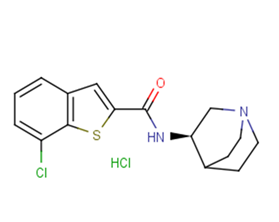
EVP-6124 hydrochloride
CAS No. 550999-74-1
EVP-6124 hydrochloride ( EVP-6124 (hydrochloride )
产品货号. M17537 CAS No. 550999-74-1
EVP-6124 盐酸盐是一种新型 α7 神经元烟碱乙酰胆碱受体 (nAChR) 部分激动剂。
纯度: >98% (HPLC)
 COA
COA
 Datasheet
Datasheet
 HNMR
HNMR
 HPLC
HPLC
 MSDS
MSDS
 Handing Instructions
Handing Instructions
| 规格 | 价格/人民币 | 库存 | 数量 |
| 2MG | ¥1280 | 有现货 |


|
| 5MG | ¥1912 | 有现货 |


|
| 10MG | ¥2454 | 有现货 |


|
| 25MG | ¥4188 | 有现货 |


|
| 50MG | ¥6059 | 有现货 |


|
| 100MG | ¥8505 | 有现货 |


|
| 200MG | 获取报价 | 有现货 |


|
| 500MG | 获取报价 | 有现货 |


|
| 1G | 获取报价 | 有现货 |


|
生物学信息
-
产品名称EVP-6124 hydrochloride
-
注意事项本公司产品仅用于科研实验,不得用于人体或动物的临床与诊断
-
产品简述EVP-6124 盐酸盐是一种新型 α7 神经元烟碱乙酰胆碱受体 (nAChR) 部分激动剂。
-
产品描述EVP-6124 hydrochloride is a new-type partial agonist of α7 neuronal nicotinic acetylcholine receptors (nAChRs).(In Vitro):Encenicline (EVP-6124) displaces [3H]-MLA (Methyllycaconitine) (Ki=9.98 nM, pIC50=7.65±0.06, n=3) and [125I]-α-bungarotoxin (Ki=4.33 nM, pIC50=8.07±0.04, n=3). Encenicline (EVP-6124) is approximately 300 fold more potent than the natural agonist ACh (Ki=3 μM), measured in binding assays using [3H]-MLA. Encenicline hydrochloride inhibits the 5-HT3 receptor by 51% at 10 nM, the lowest concentration tested. Evaluation of the human 5-HT2B receptor expressed in CHO cells demonstrates displacement of [3H]-mesulergine (Ki=14 nM) and only antagonist activity in the rat gastric fundus assay at an IC50 of 16 μM. In binding and functional experiments, Encenicline (EVP-6124) shows selectivity for α7 nAChRs and does not activate or inhibit heteromeric α4β2 nAChRs. (In Vivo):Encenicline hydrochloride has good brain penetration and an adequate exposure time. Encenicline hydrochloride (0.3 mg/kg, p.o.) significantly restores memory function in scopolamine-treated rats (0.1 mg/kg, i.p.) in an object recognition task (ORT). Although donepezil at 0.1 mg/kg, p.o. or Encenicline hydrochloride at 0.03 mg/kg, p.o. did not improve memory in this task, co-administration of these sub-efficacious doses fully restored memory. In a natural forgetting test, an ORT with a 24 h retention time, Encenicline hydrochloride improved memory at 0.3 mg/kg, p.o. This improvement is blocked by the selective α7 nAChR antagonistmethyllycaconitine (0.3 mg/kg, i.p. or 10 μg, i.c.v.). Encenicline hydrochloride is found to bind moderately to rat plasma proteins with a mean fu of 0.11±0.01 (mean±SD) or 11%. Over a range of 0.1-30 mg/kg, p.o., Encenicline hydrochloride demonstrates proportional dose escalation. Tmax is at 4 h in plasma and 2 h brain, although the brain concentrations remained similar between 2 and 8 h. The B:P ratios are 1.7-5.1 between 1 and 8 h. Pharmacokinetic studies have shown that Encenicline hydrochloride (0.4 mg/kg, i.p.) reaches peak brain concentration 2 hr after administration and remains at effective concentrations for at least 4 hr.Encenicline hydrochloride is administered to WT mice at ZT0 (0.4 mg/kg i.p single dose) and significantly increases the saturation index of NMDARs in slices obtained 4 hr later without causing prolonged wakefulness or enhanced locomotor activity .
-
体外实验Encenicline (EVP-6124) displaces [3H]-MLA (Methyllycaconitine) (Ki=9.98 nM, pIC50=7.65±0.06, n=3) and [125I]-α-bungarotoxin (Ki=4.33 nM, pIC50=8.07±0.04, n=3). Encenicline (EVP-6124) is approximately 300 fold more potent than the natural agonist ACh (Ki=3 μM), measured in binding assays using [3H]-MLA. Encenicline hydrochloride inhibits the 5-HT3 receptor by 51% at 10 nM, the lowest concentration tested. Evaluation of the human 5-HT2B receptor expressed in CHO cells demonstrates displacement of [3H]-mesulergine (Ki=14 nM) and only antagonist activity in the rat gastric fundus assay at an IC50 of 16 μM. In binding and functional experiments, Encenicline (EVP-6124) shows selectivity for α7 nAChRs and does not activate or inhibit heteromeric α4β2 nAChRs.
-
体内实验Encenicline hydrochloride has good brain penetration and an adequate exposure time. Encenicline hydrochloride (0.3 mg/kg, p.o.) significantly restores memory function in scopolamine-treated rats (0.1 mg/kg, i.p.) in an object recognition task (ORT). Although donepezil at 0.1 mg/kg, p.o. or Encenicline hydrochloride at 0.03 mg/kg, p.o. did not improve memory in this task, co-administration of these sub-efficacious doses fully restored memory. In a natural forgetting test, an ORT with a 24 h retention time, Encenicline hydrochloride improved memory at 0.3 mg/kg, p.o. This improvement is blocked by the selective α7 nAChR antagonist methyllycaconitine (0.3 mg/kg, i.p. or 10 μg, i.c.v.). Encenicline hydrochloride is found to bind moderately to rat plasma proteins with a mean fu of 0.11±0.01 (mean±SD) or 11%. Over a range of 0.1-30 mg/kg, p.o., Encenicline hydrochloride demonstrates proportional dose escalation. Tmax is at 4 h in plasma and 2 h brain, although the brain concentrations remained similar between 2 and 8 h. The B:P ratios are 1.7-5.1 between 1 and 8 h. Pharmacokinetic studies have shown that Encenicline hydrochloride (0.4 mg/kg, i.p.) reaches peak brain concentration 2 hr after administration and remains at effective concentrations for at least 4 hr. Encenicline hydrochloride is administered to WT mice at ZT0 (0.4 mg/kg i.p single dose) and significantly increases the saturation index of NMDARs in slices obtained 4 hr later without causing prolonged wakefulness or enhanced locomotor activity .
-
同义词EVP-6124 (hydrochloride
-
通路Others
-
靶点Other Targets
-
受体α7 nAChR
-
研究领域Neurological Disease
-
适应症——
化学信息
-
CAS Number550999-74-1
-
分子量357.3
-
分子式C16H17ClN2OS·HCl
-
纯度>98% (HPLC)
-
溶解度DMSO : ≥ 50 mg/mL; 139.94 mM
-
SMILESC1CN2C[C@@H](C1CC2)NC(=O)c1sc2c(c1)cccc2Cl.Cl
-
化学全称——
运输与储存
-
储存条件(-20℃)
-
运输条件With Ice Pack
-
稳定性≥ 2 years
参考文献
1. Prickaerts J, et al. Neuropharmacology. 2012 Feb;62(2):1099-110.
产品手册




关联产品
-
DO34
DO34 是一个强效的、选择性的、具有中枢活性的二酰基甘油脂肪酶 (DAGL) 抑制剂,其对 DAGLα 转换的 IC50 值为 6 nM,对 DAGLβ 的IC50 值为 3-8 nM。
-
Platycodigenin
从桔梗中分离出的桔梗皂苷元,对 HSC-T6 细胞系具有体外抗增殖活性。
-
[Des-Tyr1] Dynorphin...
[Des-Tyr1] Dynorphin A (1-8)



 021-51111890
021-51111890 购物车()
购物车()
 sales@molnova.cn
sales@molnova.cn







